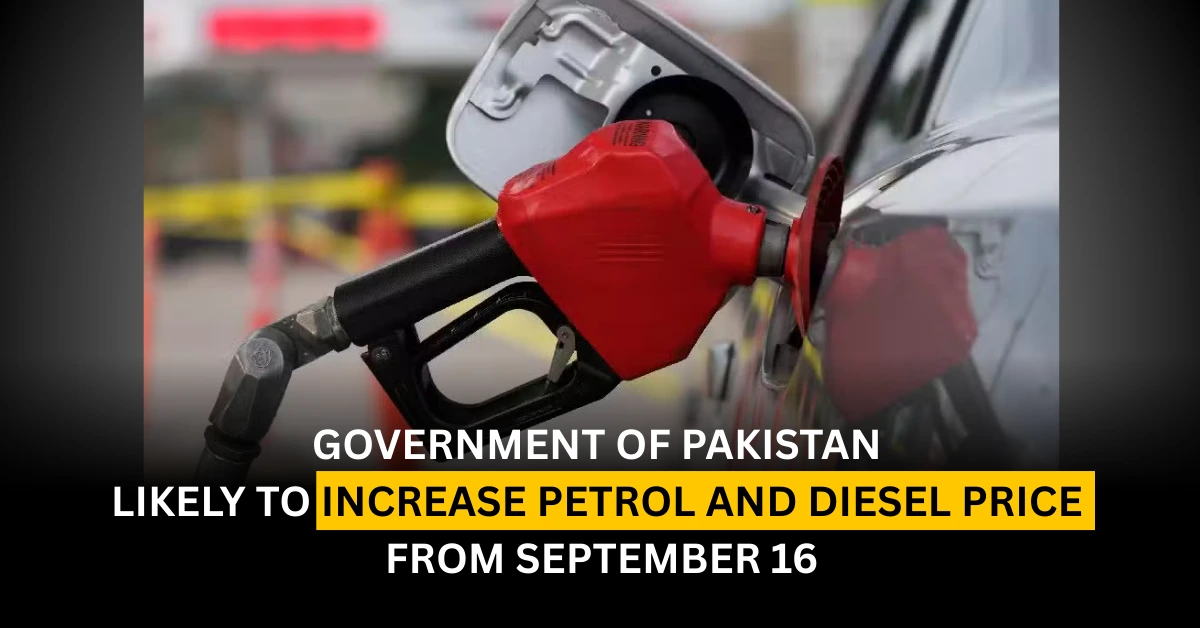The Government of Pakistan is preparing to announce a fresh increase in the Petrol and Diesel Price starting September 16, 2025. The expected adjustment follows recommendations from the Petroleum Ministry and Finance Ministry, based on calculations by the Oil and Gas Regulatory Authority (OGRA). Final approval will be given by Prime Minister Shehbaz Sharif, after which the revised rates will be enforced. This upcoming Petrol and Diesel Price revision is likely to add further economic hardship and increase public frustration.
Expected Petrol and Diesel Price Hike
According to initial estimates, all major fuel categories, including petrol, diesel, kerosene, and light diesel oil, are expected to become costlier.
| Fuel Type | Current Price (Rs/litre) | Expected Increase (Rs) | New Price (Approx.) |
|---|---|---|---|
| Petrol | 264.61 | +1.54 | 266.18 |
| High-Speed Diesel | 285.83 | +4.79 | 290.62 |
| Kerosene | 176.81 | +3.06 | 179.87 |
| Light Diesel Oil (LDO) | 159.76 | +3.68 | 163.44 |
This Petrol and Diesel Price hike, if approved, will take effect from midnight on September 16.
Also Read:
Islamabad–Rawalpindi Rail Car Project Approved to Transform Commuting
Decision-Making Process
- OGRA prepares a pricing proposal reflecting global and local market trends.
- The Petroleum Ministry evaluates and forwards it to the Finance Ministry.
- Prime Minister Shehbaz Sharif gives final approval.
- The revised Petrol and Diesel Price will then be implemented nationwide.
Public Reaction
The possible Petrol and Diesel Price increase has generated strong public frustration. Citizens argue that repeated hikes are unjustifiable while oil prices in the international market remain relatively stable. Many fear that this decision will worsen economic hardship already faced by middle- and low-income households.
Why Petrol and Diesel Price Is Rising
- Fluctuations in the international market for crude oil.
- Exchange rate pressures increasing import costs.
- Rising petroleum levies and carbon taxes.
- Distribution costs under the Inland Freight Equalisation Margin (IFEM).
Economic Consequences
The expected Petrol and Diesel Price hike will likely:
- Drive up transport costs, leading to higher prices of essential goods.
- Raise public transport fares, particularly due to diesel’s critical role.
- Intensify inflation, creating more economic hardship across the country.
What’s Next?
The final word on the Petrol and Diesel Price rests with Prime Minister Shehbaz Sharif. If approved, the new rates for petrol, diesel, kerosene, and light diesel oil will be enforced from September 16, 2025. The upcoming revision reflects the government’s attempt to manage fiscal challenges, but it also deepens concerns about affordability and its impact on everyday life.




Join The Discussion